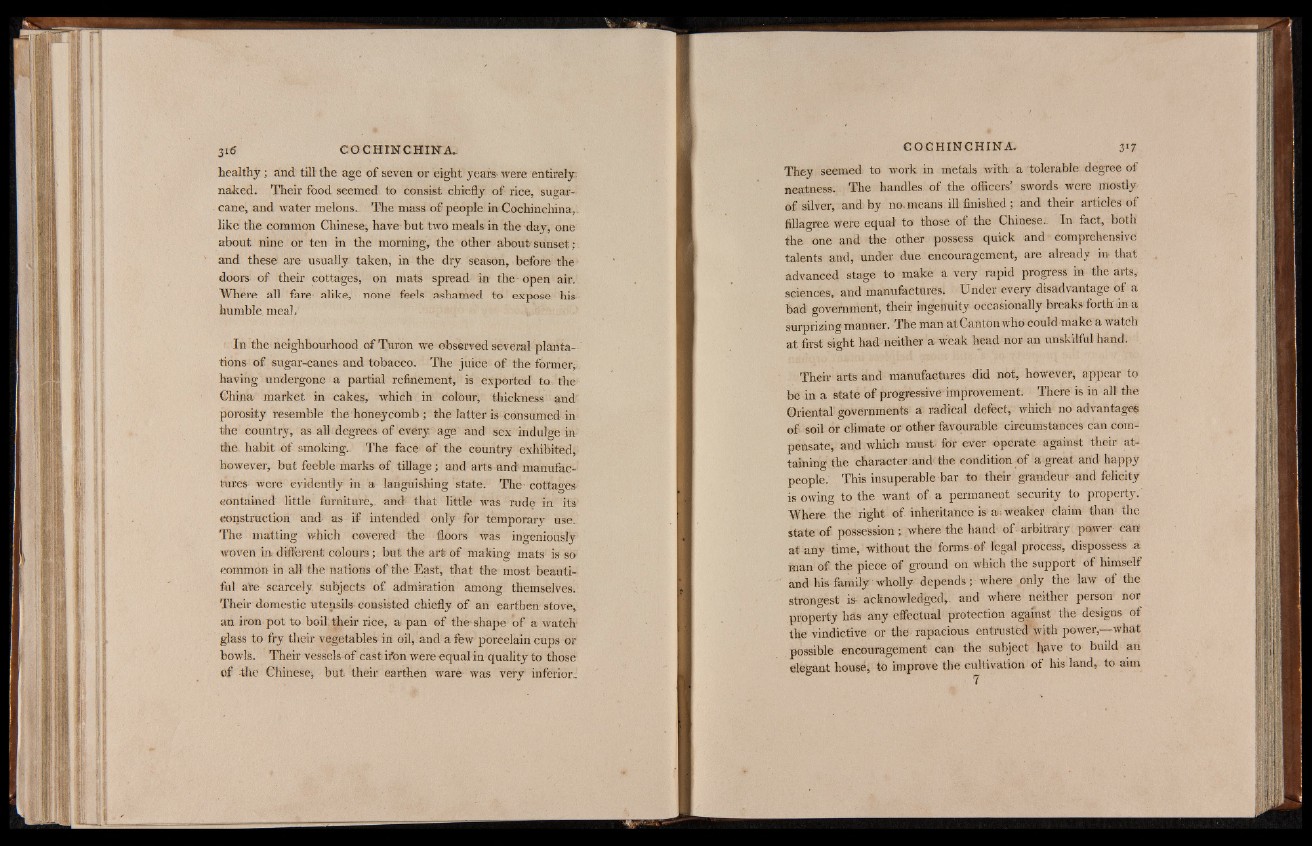
healthy; and till the age of seven or eight years- were entirely
naked. Their food seemed to consist chiefly of rice, sugarcane,
and water melons. The mass of people in Cochinchina,.
like the common Chinese; have but two meals in the day, one
about nine or ten in the morning, the other about sunset;
and these are usually taken, in the dry. season, before the-
doors of their cottages, on mats spread in the-open air.
Where all fare alike, none feels ashamed to expose his
humble meal.
In the neighbourhood of Turon we observed several plantations
of sugar-canes and tobacco. The juice of the former,
having undergone a partial refinement, is exported to. the
China market in cakes, which in colour, thickness and
porosity resemble the honeycomb ; the latter is consumed in
the country, as all degrees of every age and sex indulge in
die. habit of smoking.. The face of the country exhibited,
however, but feeble marks of tillage; and arts and manufactures
were evidently in a languishing state. The- cottages
contained little furniture,, and that little was rude in its
construction and;- as if intended only for temporary use.
The matting which covered the floors was ingeniously'
woven in different colours; but the art of making mats is so
common in all the nations of the East, that the most beautiful
are scarcely subjects of admiration among themselves.
Their domestic utensils- consisted chiefly of an earthen stove,
an iron pot to boil: their rice; a pan of the shape of a- watch
glass to fry their vegetables in oil, and a few porcelain cups or
bowls. Their vessels-of cast ifon were equal in quality to those
of -the Chinese; but their earthen ware was very inferior.
They seemed to work in metals with a tolerable degree of
neatness. The handles of the officers’ swords were mostly
of silver, and by no- means ill finished; and their articles of
fillagree were equal to those of the Chinese. In fact, both
the one and the other possess quick and comprehensive
talents and, under due encouragement, are already in-that
advanced stage to make a very rapid progress in the arts,
sciences, and manufactures. Under every disadvantage of a
bad government, their ingenuity occasionally breaks forth-in a
surprizing manner. The man at Canton who could make a watch
at first sight had neither a weak head nor an unskilful hand.
Their arts and manufactures did not, however, appear to
be in a state of progressive improvement. There is in all the
Oriental governments a radical defect, which no advantage?
of soil or climate or other favourable circumstances can compensate,
and which must for ever operate against their attaining
the character and the condition of a great and happy
people. This insuperable bar to their grandeur and felicity
is owing to the want of a permanent security to property.
Where the right of inheritance is a-weaker claim than the
state of possession; where the hand of arbitrary power can
at any time, without the forms of legal process, dispossess a
man of the piece of ground on which the support of himself
and his family wholly depends; where only the law of the
strongest is- acknowledged,, and where neither person nor
property has any effectual protection against the designs of
the vindictive or the rapacious entrusted"with power,—what
possible encouragement can the subject have to build an
elegant house, to improve the cultivation 7 of his land, to aim